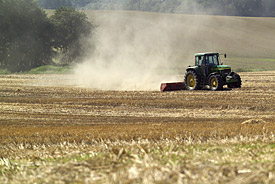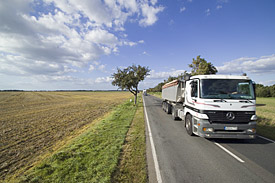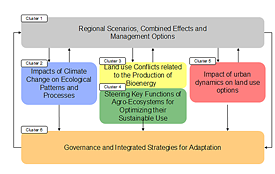Land Use Options - Strategies and Adaptation to Global Change
The main challenge which drives the research questions of Topic I is to develop strategies and policies for sustainably managing the limited resource land as part of mitigation and adaptation to Global Change (esp. climate change, land use change, urbanisation) on a regional scale. This requires a systemic approach which can cope with the complexity of interactions of various subsystems (biological as well as social). We will tackle this challenge using scenario analysis techniques. Based on given regional storylines consistent scenarios will be developed and used to derive desired future development options. Qualitative and quantitative research on the impacts of Global Change on terrestrial ecosystems and their biodiversity will be analyzed within this frame. Finally, institutional frameworks and policies will be analysed and included in the scenario development. This goes hand-in-hand with developing options for their improvement and analysing their applicability.
Challenges


The focal point in this Topic is the limited resource "land". It is used for different purposes, as for agriculture or infrastructure. Its use for one purpose often excludes others.
Photos: André Künzelmann
Global Change is constituted by the driving and interacting processes of climate change, land use change, and urbanisation, also involving institutional change. Global Change has impacts on the availability and distribution of resources as well as on the dynamics and stability properties of ecosystems and hence on ecosystem functions and services. These impacts, such as changes in climate variability or altered production patterns, are most pronounced on a regional scale. It is at the same regional scale where measures for the mitigation of or adaptation to the impacts of Global Change need to be considered, because they depend strongly on the specificity of regional conditions. In spite of the fact that an important share of food, energy and information are globally distributed, we still depend on our regional environment and - at the same time - shape this environment by the ways in which we use land for agricultural production, urbanization or measures of nature protection and conservation.
Thus the focal point in this PT is the limited resource "land". Its use for one purpose often excludes others: bioenergy production can compete with food production, settlement with biodiversity conservation, recreation with the production of renewable resources, etc. These trade-offs are aggravated under conditions of Global Change (e.g. when demands of goods and services are increased due to demographic development). At the same time, land use management in Europe offers a broad range of options for adapting to and mitigating Global Change impacts. In order to develop land use strategies a systemic approach is needed, which can cope with the complexity of interaction of the various subsystems and land-use conflicts involved. Relevant elements of this complexity include abiotic and biotic processes, population dynamics, demographic and economic development, land use decisions, etc. Several challenges for developing land use options follow from these considerations:
- Consistent scenarios on a regional scale are needed for an integrated impact assessment of Global Change patterns.
- Knowledge about the strength, functioning and effects of the feedbacks between different processes is required for assessing possible development paths as well as for the analysis of uncertainties.
- The development of models, methods and tools that can inform stakeholders about both possible consequences and uncertainties is required in order to be able to elaborate desirable development paths and strategies.
- Understanding of current governance structures - as a means to develop and implement innovative institutional solutions and policy instruments – is required for the purpose of transferring scientific results to stakeholders and decision makers.
Contents and Goals
First, in order to cope with the complexity of interactions of factors determining land use we will apply scenario analysis
techniques. The goals are to develop consistent regional scenarios based on storylines which are to be adapted to regional
requirements and further developed to desired future development patterns. The temporal focus of the scenarios lies
within the next 50 years.br />
Second, in order to assist decision makers with these scenarios and to provide system understanding, our goal is to study all the
relevant regional processes in an integrative way, e.g. by analyzing the feedbacks of subsystems. The methodological focus
lies on the development of joint models and tools by an interdisciplinary team of natural and social scientists. Qualitative and
quantitative research, modelling and simulation will be based on both available data sets and scenarios, together with
new experimental work, monitoring and observation platforms. The facilities and methods provided by Topic VI "Methods and
Modelling terrestrial systems" will also be exploited in support of these activities. The Global Change-related impacts considered
are: (i) the impacts of climate change on ecological patterns and processes, (ii) the impacts of bioenergy policy on key
functions of agro-ecosystems and on land use conflicts, and (iii) the impacts of urban dynamics on land use options.
Third and finally, institutional frameworks and policies will be analysed and included in the scenario development. This goes
hand-in-hand with developing options for their improvement and analysing their applicability.
Expected Results
- Scenarios of desired and possible future developments on a regional scale.
- Impact analysis based on (i) field experiments concerning impacts of climate change on biodiversity and (ii) models to provide mechanistic understanding of the utilized systems.
- New methods and tools for (i) the assessment of environmental risks in order to minimize negative direct and indirect human impacts, (ii) the development of options for resolving land use conflicts and (iii) the derivation of land use options for maintaining and supporting ecosystem services.
- Policy recommendations for mitigating and adapting to regional impacts of Global Change. This includes the design of innovative policies, novel instruments and science-policy interfaces, as well as reflexive management strategies for shaping institutional change.
Structure of the topic and cluster descriptions
The framework for all activities of this Programme Topic is provided by integrative regional scenarios. Cluster 1 develops
consistent integrated scenarios at a regional scale, based on existing global scenarios concerning climate change,
land use and demographic, economic and institutional development. Secondly, the cluster assesses combined effects of
different drivers of Global Change on ecosystem services, and develops management options.
Clusters 2 to 5 focus on the analysis of impacts of Global Change: Cluster 2 provides insights regarding the impacts of climate
change on various species, their ranges, and community compositions, together with stability properties of ecosystems
and the services provided. Cluster 3 and 4 seek to analyse land use conflicts that originate from an increasing production
of bioenergy. While Cluster 3 focuses on modelling on the landscape level, Cluster 4 has an experimental focus: It aims at the
compilation of management knowledge for steering agro-ecosystems. It will focus on new production systems and will be closely
linked to Topic II. Cluster 5 focuses on an improved understanding of the human-driven dynamics of land use change in
urbanized regions and their impacts on land resources.
Cluster 6 analyses and develops options for Governance and Integrated Strategies for Adaptation at the regional level. Based on the scenarios (Cluster 1) and the improved system understanding provided by Clusters 2 to 5, management options and policy instruments to resolve land use conflicts and to optimize land use patterns will be developed.
Publication
Literatur: SEPPELT, R., KÜHN, I., KLOTZ, S., KABISCH, S., SCHLOTER, M., GÖRG, C., FRANK, K., JAX, K., AUGE, H. (2009).
Land Use Options - Strategies and Adaptation to Global Change. GAIA. 18/1: 77-80
download publication

